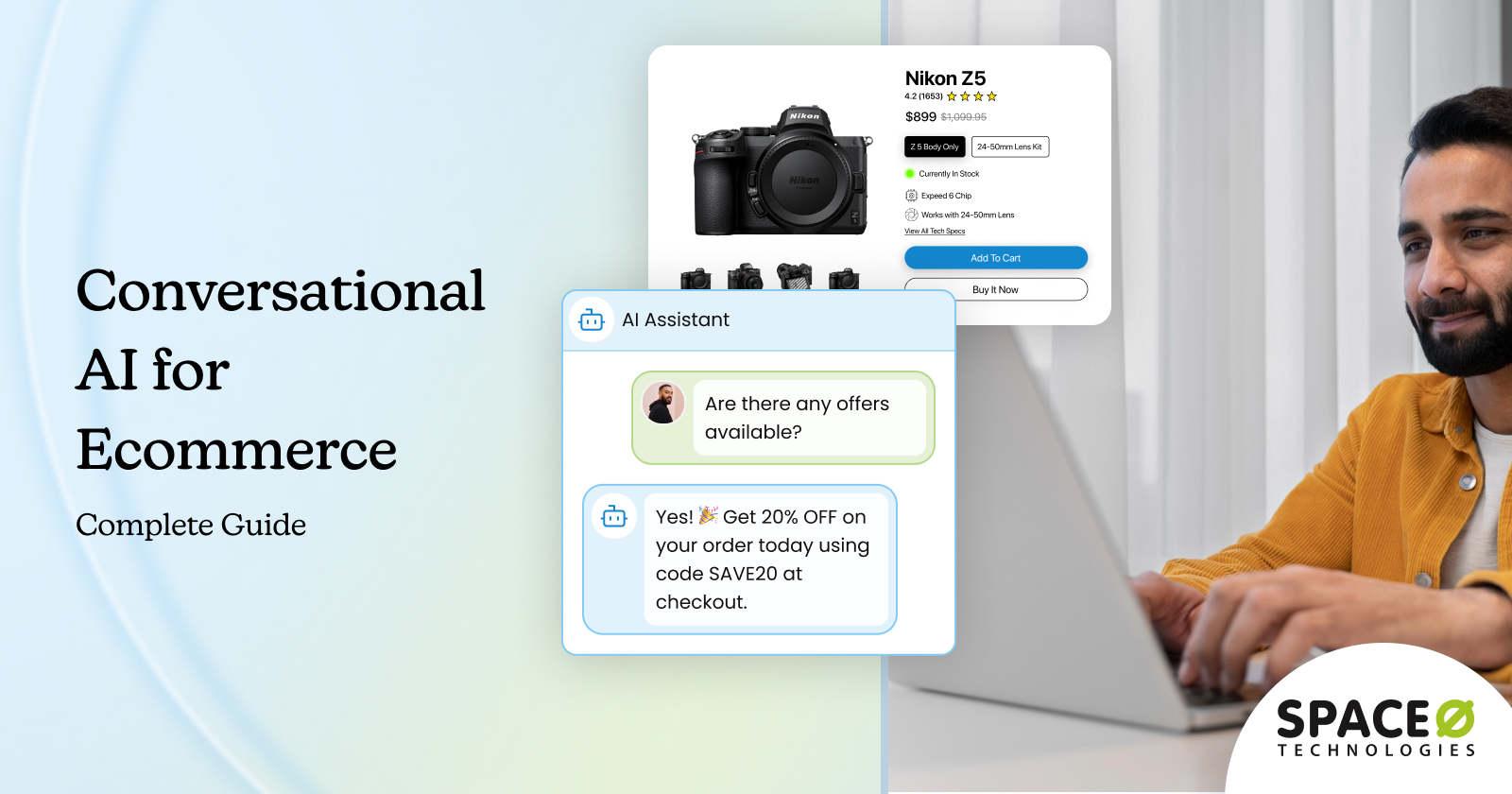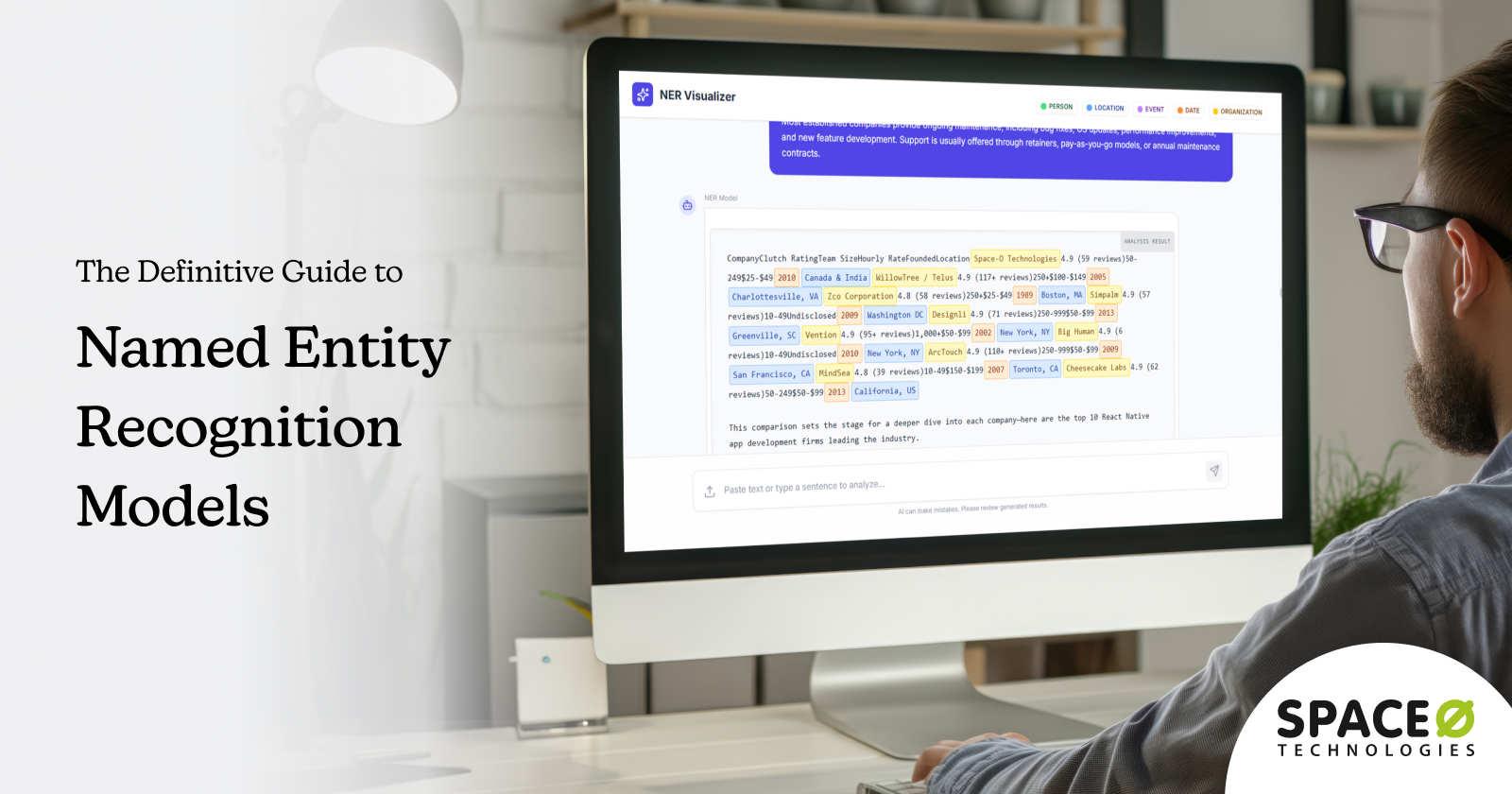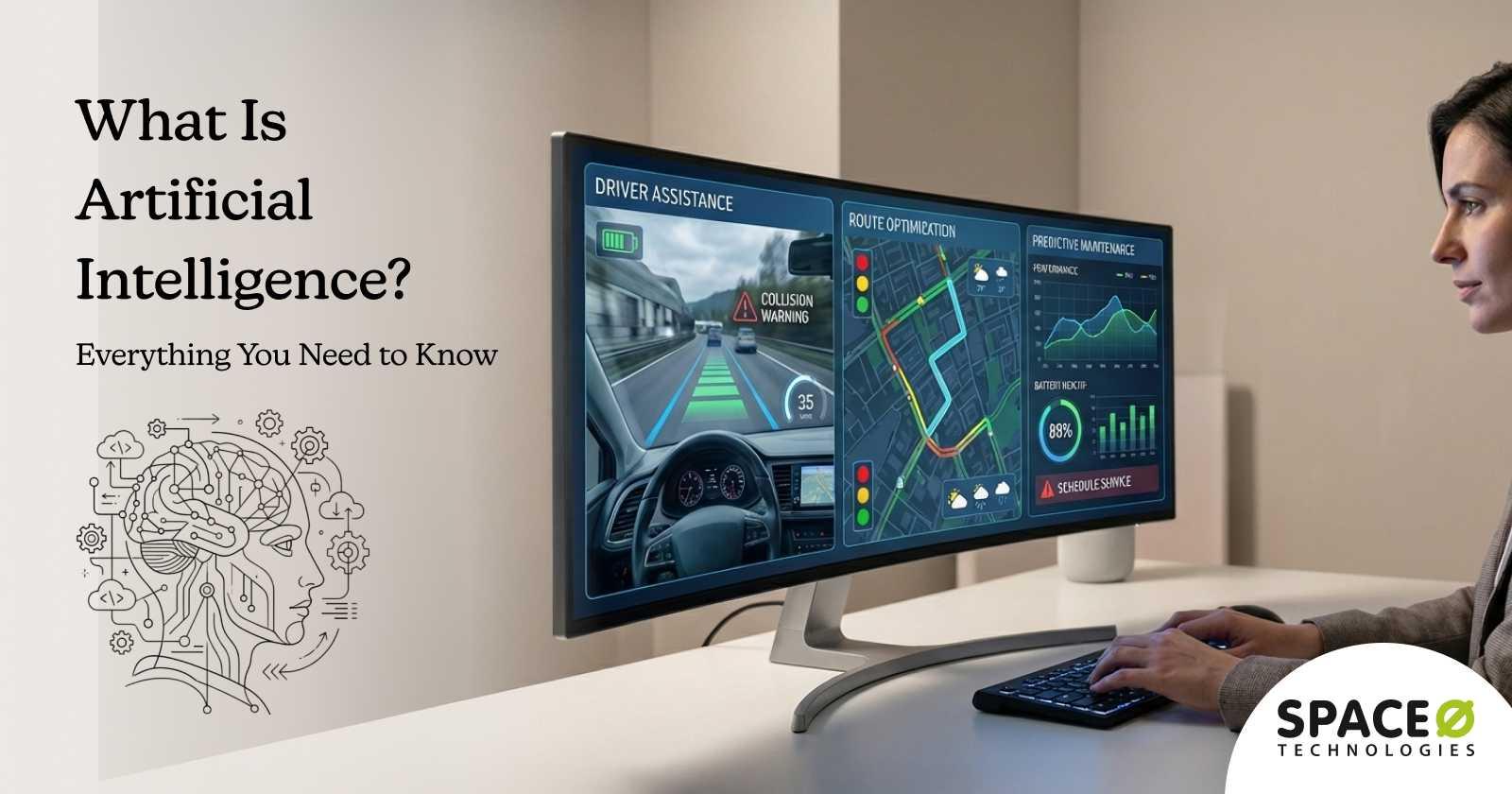- What Is Enterprise AI?
- 5 Benefits of Using AI in Enterprise Operations (With Use Cases)
- How to Implement Artificial Intelligence in Enterprises
- Cost of developing AI solutions for enterprises
- Challenges in AI Adoption and How Space-O Can Help
- Implement AI-powered Enterprise Software With Space-O
- Frequently Asked Questions
Enterprise AI Explained: Concept, Benefits, Use Cases, and Challenges

Artificial intelligence is changing how businesses work and respond to different situations, challenges, and opportunities. This is especially true for large-scale organizations or enterprises where AI is becoming the driving force for brand success.
As per a report by Precedence Research, the market size for enterprise-grade AI was estimated at USD 10.08 billion in 2023 and is projected to reach USD 270.06 billion by 2032. This isn’t astonishing, for enterprise AI helps large-scale organizations solve complex challenges by deploying automation in business operations. The results are better decision making prowess, reduced costs, and exponential growth.
Being an experienced enterprise AI development company, we have the expertise to help you understand how artificial intelligence is making enterprises smarter, more efficient, and more responsive. Get complete information on the fundamentals, benefits, implementation process, and challenges of AI adoption in an enterprise context. Let’s begin.
What Is Enterprise AI?
Enterprise AI refers to artificial intelligence and machine learning solutions specially developed for enterprise operations. Being enterprise-centric, these solutions are built at scale and can handle complex processes and challenges of large-scale businesses.
Enterprise artificial intelligence models merge a range of technologies to automate various business processes, from data entry to strategic planning and beyond. As AI tech continues to progress, its applications in enterprises are growing as well.
Do note that enterprise-level AI tech is not the same as your daily AI. It is more advanced, outcome-centric, and offers data-driven business insights. The coming section sheds light on the difference between the two.
Difference between enterprise-grade AI and regular AI
Are you wondering, ‘Can we use regular AI technology for our operations?’ The short answer is no. AI solutions used by enterprises vary in purpose, scale, and ideal use cases against regular AI. Here is a detailed difference between the two:
| Aspects | Enterprise-grade AI | Regular AI |
|---|---|---|
| 🎯 Purpose | To optimize business processes, improve decision-making, and enhance efficiency. | Broader applications, including those for businesses as well as consumers. |
| 🧩 Application Areas | Customer service, strategic planning, data analytics, supply chain optimization, etc. | Personal assistants, healthcare diagnostics, AI-powered chatbots, entertainment, etc. |
| 🛠️ Customization | Tailored specifically for an individual organization’s requirements. | General solutions, which are usually not tailored for specific individuals/organizations. |
| 🚀 Deployment Scale | Deployed at a large scale with significant infrastructure and an AI ecosystem. | Deployment scale varies on the end user and is relatively smaller than that for enterprise AI. |
| 🛢️ Data Requirement | Requires processing large volumes of enterprise-specific data. | Data requirement varies with particular applications and usage. |
| 💡 Examples | AI-powered sales forecasting systems to predict future sales and project revenue. | Personal assistants like Alexa and Siri that help consumers with everyday tasks. |
Now that you know how enterprise-level AI technology is different from regular AI, you must be wondering, ‘Why should our enterprise invest in AI technology?’ Let’s find out how enterprises can benefit from AI technologies.
5 Benefits of Using AI in Enterprise Operations (With Use Cases)

Here are some key advantages you can avail by investing in enterprise AI tech, along with specific use case scenarios of enterprises experiencing these benefits.
1. Improves decision making
Machine learning algorithms turn historical enterprise data into insights that serve as grounds for strategic planning. Moreover, AI models leverage this data to understand trends and predict the future—thus fail-proofing your strategies.
Use case from the logistics industry
In logistics operations, freight vehicles require regular maintenance to work smoothly. Delaying or missing maintenance results in vehicle breakdowns and hampers shipment processes. AI tech deploys predictive maintenance principles to analyze when vehicles require maintenance, thus avoiding unexpected vehicle breakdowns and optimizing fleet processes.
2. Continuous workflow automation
As per a report by Asana, 60% of employees’ time is spent on ‘work about work’ tasks like reporting, data entry, data analysis, and document hunting. These tasks are easily automatable, and AI does just that. By automating routine tasks with AI, you can improve human resource management, maximize human capital ROI, and save your employees from boredom.
Use case from the insurance industry
Processing insurance claims requires significant work, specifically in data collection and entry. The data needs to be collected from documents and entered into systems. AI helps automate these repetitive tasks and automatically extracts, enters, and even processes data, saving time and improving claim management for insurance companies.
3. Prevents revenue leakage
AI tools can help your enterprise-level business identify market risks, eliminate inefficiencies, automate redundant tasks, and accurately forecast industry trends. Awareness of risks, opportunities, threats, and strengths helps enterprises significantly save costs and maximize revenue.
Use case from the eCommerce industry
eCommerce segments like fashion, electronics, and health and wellness markets are unpredictable as e-retailers in these niches often overstock and understock inventories, resulting in losses. AI helps accurately predict market trends, thus offering reliable insights for inventory management.
4. Elevates customer experience
AI systems, leveraging natural language processing (NLP) models, are capable of understanding and resonating with human sentiments. Your enterprise can leverage AI sentiment analysis as a window to your customer’s emotions and better understand their preferences, thus improving customer experience.
Use case from the hospitality industry
Hotel chains use AI-led sentiment analysis, in combination with NLP models, to bulk-process guest feedback. This helps understand best-performing services and customer dissatisfactions and find areas of improvement, helping hotel chains continuously improve their guest experience.
5. Boosts operational efficiency
There is no doubt that AI is faster than humans in almost everything. In the context of enterprise operations, AI helps speed up routine workflows with high precision, be it offering resolution to customer queries or accelerating specific processes.
Use case from the banking industry
Customer identity verification is essential for banks, among other financial institutions. However, verifying customer identity manually takes time and can be a bottleneck in other processes. AI helps solve this challenge by automating KYC processes and enabling customers to self-run identity verification, accelerating onboarding from hours to minutes. Moreover, AI-led fraud detection and identity verification are much more reliable and accurate.
Make Your Enterprise Future-ready With AI
Space-O offers enterprise-grade AI solutions that propel business growth. We help brands solve complex challenges through precise artificial intelligence tech.
These are the benefits of AI implementation for enterprises. Now, let’s discuss how businesses can implement AI solutions.
How to Implement Artificial Intelligence in Enterprises

Implementing an AI system in your enterprise is a strategic decision. Here are the steps to follow to implement AI in your enterprise:
Step 1: Define KPIs
Start by establishing clear, measurable, and strategic Key Performance Indicators (KPIs). These KPIs will serve as metrics to understand the success of AI implementation in your enterprise. In addition, set baselines by measuring the current performance to act as a marker for measuring deviations.
Step 2: Check compatibility
Running a compatibility check helps ensure optimal usage of AI in your processes. Before building an AI solution, you must ensure that:
- Your legacy systems can be integrated with the AI system.
- Your current processes can adopt AI tech.
Step 3: Choose AI models
ick an AI model based on your AI implementation and software development objectives. Generative AI, natural language processing, neural networks, and deep learning are commonly used models among enterprises. You may also consult with an AI expert to find and choose the right model for your project.
Step 4: Train the AI model
Once you have chosen an AI model, it is time to train it using data sets. Big data training helps mold the model to understand your business functions, challenges, and solutions. Utilize data models showcasing challenges and solutions for the best model training.
Once trained, the model needs to be assessed and fine-tuned until it delivers the expected/ideal results.
Step 5: Integrate and monitor
Integrate the enterprise software in your business operations and continuously monitor it. Integration also involves training your team to adopt AI in everyday processes. As your processes change, the AI model will need to be continuously re-tuned.
The process of building enterprise AI solutions is complex. But worry not, we are here to help. Space-O offers best-in-class AI development services for enterprises. With the right skills, talent, and technology, we are fully equipped to help your enterprise adopt AI.
Partner With Space-O for Your Enterprise’s AI Enablement
Fuel your enterprise’s digital transformation and embrace artificial intelligence in the most efficient way with Space-O.
So far, we have covered all the critical aspects of enterprise artificial intelligence. Now, let’s discuss the cost of building AI-powered solutions for enterprises.
Cost of developing AI solutions for enterprises
‘How much will it cost us to develop an enterprise-grade AI solution?’ If this question springs to your mind, we have the answer ready. Developing enterprise-grade AI software with advanced automation capabilities in countries like the USA can cost from USD 5,000 to USD 50,000.
This is just an estimation based on our experience and expertise. There are many factors at play, such as:
- Exact software requirements
- Complexity of the AI model
- Algorithm selection
- Team composition
- Development location
- AI developer’s experience and expertise
- Your business vertical
- Deployment scale
Read our blog on AI development costs to get complete information on the subject. You can also get a custom quote from our team for your AI project.
Do note, that adopting AI solutions is not always a cakewalk for enterprises. There are many challenges on the way. However, experienced AI engineering partners like Space-O make the journey easy. Let’s find out how.
Challenges in AI Adoption and How Space-O Can Help

Here are some common challenges large-scale businesses may face while implementing AI-based solutions. As a leading AI development company, Space-O helps get ahead of these obstacles. Let’s find out how.
Challenge #1: Lack of quality data availability
Training machine learning models requires using quality and relevant data. Using low-quality (irrelevant) data results in inaccurate results.
Space-O helps find and refine your historical data to improve its quality and relevance. With high-quality data at your disposal, your model will deliver the best results.
Challenge #2: Uncertainty of success
Most business executives are unsure if their AI vision will be successful. Moreover, identifying ideal use cases of AI is also challenging in complex business scenarios.
Space-O helps validate ideas through a solid Proof of Concept (PoC). We also offer innovative use case assessment services to help you discover specific AI uses that focus on solving your unique business challenges.
Challenge #3: Insufficient AI development expertise
Deciding to create enterprise AI solutions without having the right expertise in AI technologies is a recipe for disaster. Various technical aspects like model selection and fine-tuning could be compromised.
With experience in finishing over 147 AI projects, Space-O has the right technical expertise to shape your enterprise challenges into innovative AI solutions.
Challenge #4: Incompatibility with legacy systems
There are chances that the developed AI software solutions may be incompatible with your existing systems. This could create bottlenecks in implementation and even hamper your other business operations.
Space-O follows a careful assessment process where we check and ensure compatibility with legacy software. We craft an AI technology stack that ensures the new solutions align flawlessly with existing software.
Now that you have all the information on enterprise AI technology, you can go ahead and implement it in your processes. You can partner with an AI development agency like Space-O to make the process sleek, efficient, and flawless.
Implement AI-powered Enterprise Software With Space-O
Artificial intelligence offers tremendous benefits to enterprise-scale organizations. With technologies like data science and machine learning growing at a rapid pace, the applications of AI for enterprises are expected to grow.
If you are looking to harness these benefits and augment your existing systems with AI tech, contact Space-O. We are an experienced AI engineering company offering smart solutions for enterprise operation optimization.
Our engineers hold expertise in big data, machine learning, GPT, NLP, and LLM, offering excellent tech solutions for every enterprise-level challenge. Contact us today to know more about how our expertise can benefit your brand.
Frequently Asked Questions
Which industries can benefit the most by adopting AI systems?
Artificial intelligence has applications in every industry and vertical. As per a Statista report, the top 5 industries using AI technology are healthcare, finance, manufacturing, business and legal services, and transportation.
Are there any pre-trained AI models specifically for enterprise use cases?
Yes, there are many pre-trained models available for enterprise use. A few of the best options are OpenAI’s GPT-3 and GPT-4, Google Cloud’s AutoML, IBM Watson, Microsoft Azure AI, and AWS AI Services. Organizations can fine-tune these models using their data to match their use cases.
What is the primary difference between a consumer-grade and enterprise AI solution?
The primary difference between consumer-grade and enterprise-grade AI lies in their usage, security, output, and customizability. While consumer-grade AI solutions are accessible for everyday usage, enterprise AI applications are built for complex situations and require tremendous investments.
Need Enterprise-Grade AI Solutions?
What to read next



